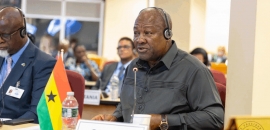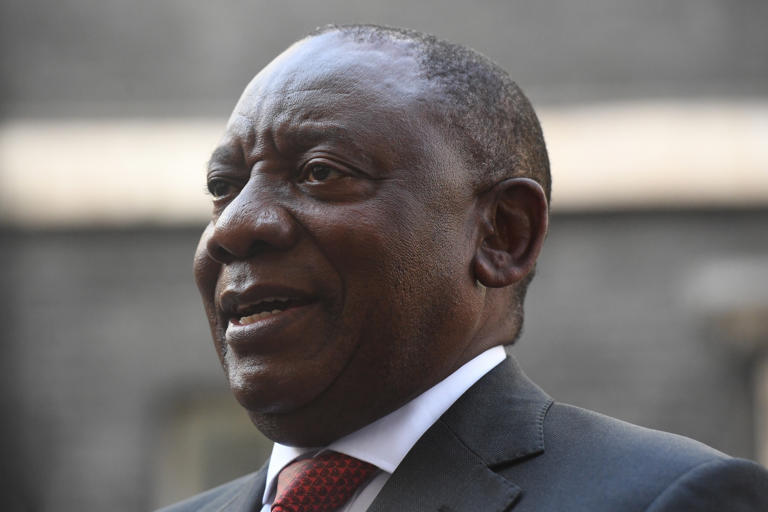
Mahama Rallies African Leaders
Sep 23, 2025
by Antonio Gronbean May 20, 2025

File photo of Cyril Ramaphosa, taken at a Commonwealth Heads of Government Meeting, in Downing Street, London, in April 2018.© AP
Other points of contention include South Africa's case against Israel at the International Court of Justice, Trump's freeze on foreign aid which has hit South Africa's HIV resources and the country's ties to Russia and China.
South African media has speculated about how the meeting will go, raising fears Ramaphosa is walking into what the Daily Maverick has called a "Zelensky-style ambush," referring to the viral clash that took place when Ukrainian President Volodymyr Zelensky visited the White House in February.
But Ramaphosa's spokesperson, Vincent Magwenya, has said the government is "not worried about any potential hostile reception."
"There is a level of decorum and courtesy that heads of states extend to one another," Magwenya added.
While South Africa has repeatedly called for a good relationship with America, with calls to "engage" with each other, Ramaphosa has not always struck this tone about Trump.
Before Trump decided to grant Afrikaners asylum, despite suspending the State Department's refugee admissions program, he called for an investigation to take place into South Africa for "confiscating land" in February.
He was referring to South Africa's Expropriation Bill, which replaced the apartheid-era version of the bill, setting out the legal procedures for South Africa to own private land for public purposes, with "nil compensation" in some circumstances.
During this time, a video of Ramaphosa launching a pointed attack on Trump resurfaced—from when the pair had clashed on this topic before, during Trump's first term in 2018.
Ramaphosa said in a speech: "I don't know what Donald Trump has to do with South African land, because he's never been here. And he must keep his America, we will keep our South Africa.
"South Africa is our land, South Africa belongs to all the people who live here in South Africa. It does not belong to Donald Trump. He can keep his America."
Ramaphosa added: "When we were facing apartheid, when we were facing oppression, he was not here. He did not fight side by side with us and we were able, on our own, yes with support of progressive forces in the world, to resolve the apartheid question.
"As far as I recall, Donald Trump was not around the negotiating table when we negotiated the end of apartheid.
"So stick around in the White House, we will do our business here and we will find solutions for our problem. So stay out of our issues and we will not get involved in your issues in America, you will have your own problems, leave us alone."
During apartheid, a white minority ruled South Africa for much of the second half of the 20th century, enforcing a system of racial segregation and political and economic discrimination against nonwhite populations. Universal suffrage was established in 1994, allowing all citizens, regardless of race, to vote in national elections.
More recently, in response to Trump's classification of white Afrikaners refugees, Ramaphosa's Ministry of International Relations and Cooperation said in a statement: "It is most regrettable that it appears that the resettlement of South Africans to the United States under the guise of being 'refugees' is entirely politically motivated and designed to question South Africa's constitutional democracy; a country which has in fact suffered true persecution under Apartheid rule and has worked tirelessly to prevent such levels of discrimination from ever occurring again."
Addressing the South African media on Saturday, Ramaphosa said: "There's no genocide in South Africa. That is a fact that's borne out of a lot of evidence."
"I'm not worried about anything. We're going there to discuss trade and our bilateral relations and that's what we're going to discuss," he said. "It's country to country and we trade with each other, so we have to relate to each other."
"We are going to have good discussions on trade," he added.

Sep 23, 2025

Jul 20, 2025

Sep 29, 2025

May 20, 2025

Oct 11, 2025

Sep 26, 2025

6 days ago

3 weeks ago